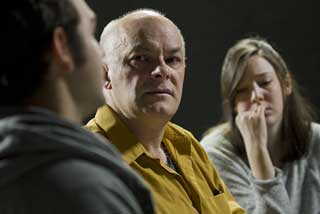The Word from Lansing: Confronting Michigan’s Growing Opioid Crisis

Posted April 21, 2017
Over twenty-five years ago, the U.S. bishops wrote that “the [Catholic] Church is called to serve, to reach out, to help rebuild lives, and to support” those struggling with drug abuse. Today, this message could not be more relevant. The widespread abuse of prescription drugs has turned into an opioid crisis, afflicting rich and poor across all areas of the state and country.
According to the Centers for Disease Control, drug overdoses reached their highest level in 2014 at 47,055 deaths. Opioids — prescription pain medication and heroin — were involved in over half those incidents. Roughly 240 million opioid prescriptions were written during that year, which, if divided up, would be more than enough to give every adult in America their own bottle of pills (U.S. Department of Health and Human Services). On a local level, data from the Michigan Department of Health and Human Services shows overdoses in Michigan have risen four-fold, with 455 in 1999 and 1,745 in 2014. Approximately 60 percent of those 2014 deaths were related to opioid and heroin.
The opioid crisis has contributed to other negative consequences. Michigan health records show the rate of hospitalizations involving opioids doubled from 2000 to 2011. The state has also seen cases of Neonatal Withdrawal Syndrome (NWS) dramatically increase in infants, which can occur from drug use (especially prescription drug use) during pregnancy. These infants are more likely to have trouble breathing, low birth weight, feeding difficulties, and seizures.
The issue of addiction is far more than just statistics. Instead, it is a painful reality Michiganders face. Many know individuals struggling with substance abuse — people in their own families, neighborhoods, workplaces, and community or religious groups — or maybe they are struggling with it themselves. They see its impact on crime rates, homelessness, and health care costs; they experience the loss and pain that comes with this disease. In 2016, Pope Francis described the “deep wound” drugs have inflicted on our society, calling addiction a “new form of slavery.” Finding ways to prevent substance abuse and provide treatment is critical, and the Church continues to accompany those in need, especially through its charitable and health services.
Most Reverend John Doerfler, Bishop of the Diocese of Marquette, recently released a joint statement on addictions with Episcopal, Lutheran, and United Methodist leaders in the Upper Peninsula. The statement sends a clear message: the faith community sees those who are struggling and is there to assist them. The leaders write, “we serve as the outstretched hand to offer God’s love and new hope for those afflicted with this disease…[providing] healing not only for the soul, but also the body.”
The State of Michigan is taking steps to address the issue as well. In 2015, Governor Rick Snyder formed a statewide task force to study prescription drug and opioid abuse, which later released a series of recommendations on prevention and treatment. While the Michigan Legislature is currently focused on discussions about the 2017–2018 state budget, a number of measures have been introduced to implement task force recommendations. The bipartisan bills would, among other aspects, update Michigan’s patient prescription history tracking system to curb “doctor shopping,” encourage greater discussion about the dangers of opioid abuse and proper disposal of medication, improve services for those suffering from opioid addiction, and increase penalties for those who wrongfully prescribe, dispense, manufacture, or distribute controlled substances.
Collaboration is needed from many stakeholders and communities to protect against abuse, while also providing appropriately for Michigan’s pain management needs. Similar collaboration is needed to address factors and conditions that can lead to addiction, such as poverty, loneliness, social pressure, and inadequate access to education. May this collaborative work take place in a way that allows those struggling with substance abuse to “be listened to, understood, loved…and healed” without judgement (Pope Francis, November 2016).
